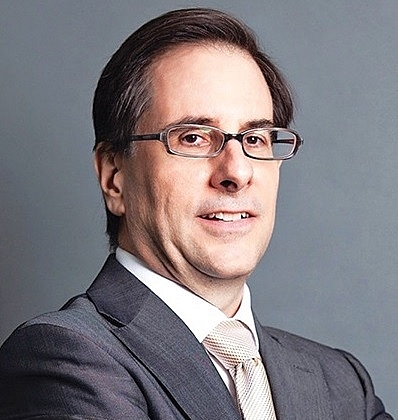Continuing to lure in international funds
 |
| Michael Kokalari, chief economist at VinaCapital |
What are the most attractive features of the local market, and why do overseas groups keep investing in Vietnam when the pandemic is making things hard, even for world-class investors?
CTBC Investments, one of the most prestigious asset management firms in Taiwan, has launched the CTBC Vietnam Equity Fund to cash in on the attractive local stock market. Meanwhile, South Korean JB Financial Group is also boosting its presence in Vietnam by setting up JB Vietnam Securities, and KKR & Co. expects to at least triple its investment in Vietnam in the next decade.
There are two reasons why foreign investors are still enthusiastic to invest in Vietnam, despite the global recession. Firstly, Vietnam has been widely recognised as one of the few countries to successfully handle the COVID-19 outbreak. The country essentially has the highest level of consumer confidence in the world, partly because of citizen trust in their government’s handling of the outbreak, according to research firm Ipsos.
Most governments responded to COVID-19 by taking measures to protect the medical and economic health of their citizens, but these short-term emergency measures so far crippled economic growth in these countries.
Furthermore, some markets like South Korea and Taiwan also have additional, serious economic problems, for example with an ageing population, that will also slow down growth over the next decade. Consequently, prospects for most of the world’s investors within their own countries seem currently limited.
With these limitations, investors are looking to find countries that have high GDP growth rates and a good business climate. For that reason, the most attractive feature of Vietnam for foreign financiers is its high economic growth prospects in the next 10 years – which seems much more promising compared to most countries in the world.
Adding to this last point, the Vietnamese economy could continue growing at a 6-7 per cent annually in the next decade, driven by the country’s rapidly growing middle class, urbanisation, and the next expected wave of FDI into the country.
Elsewhere, countries are struggling to attract investors. Last week, US Federal Reserve chairman Jerome Powell essentially told investors to expect zero interest rates in the US for at least the next five years to make it easier for homeowners to pay their mortgages and for businesses to borrow the money they need to pay their workers.
Meanwhile, the Japanese government kept interest rates at this rate for over 20 years, and its GDP growth collapsed from 5 per cent on average to 0.5 per cent over the last 20 years. The Japanese stock market is still down 40 per cent from its peak level 30 years ago.
What challenges await foreign funds in Vietnam to generate alpha?
Foreign investors’ main challenge is that Vietnam’s stock market is primarily driven by local retail investors who account for about 85 per cent of the daily trading, and both sides have different thinking and approaches.
For example, at the worst point in the COVID-19 crisis, foreigners were net selling Vietnamese stocks at the same time that local retail investors were aggressively buying. For that reason, the investors who generate alpha in the local stock market are generally those who have an understanding of its nuances and a deep competency in the financial analysis techniques.
Finally, foreign investors are always concerned about possible depreciations in the USD-VND exchange rate, but we expect the VND to start appreciating by about 2-3 per cent annually over the next few years, starting from 2021, so foreign investors’ concerns about this issue should diminish over time.
What will be the most appealing sectors luring foreign funds in Vietnam?
Foreigners prefer to invest in companies in sectors that will benefit as Vietnam’s consumers become wealthier, which includes sectors such as retail, healthcare, and real estate, as most of those investors already made money in similar companies in other frontier and emerging markets in the past. That said, we also believe that there are many companies which will benefit from the government’s on-going infrastructure development efforts.
What the stars mean:
★ Poor ★ ★ Promising ★★★ Good ★★★★ Very good ★★★★★ Exceptional
Related Contents
Latest News
More News
- VinaCapital launches Vietnam's first two strategic-beta ETFs (February 26, 2026 | 09:00)
- PM sets five key tasks to accelerate sci-tech development (February 26, 2026 | 08:00)
- PM outlines new tasks for healthcare sector (February 25, 2026 | 16:00)
- Citi report finds global trade transformed by tariffs and AI (February 25, 2026 | 10:49)
- Vietnam sets ambitious dairy growth targets (February 24, 2026 | 18:00)
- Vietnam, New Zealand seek level-up in ties (February 19, 2026 | 18:06)
- Untapped potential in relations with Indonesia (February 19, 2026 | 17:56)
- German strengths match Vietnamese aspirations (February 19, 2026 | 17:40)
- Vietnam’s pivotal year for advancing sustainability (February 19, 2026 | 08:44)
- Strengthening the core role of industry and trade (February 19, 2026 | 08:35)

 Tag:
Tag:


















 Mobile Version
Mobile Version